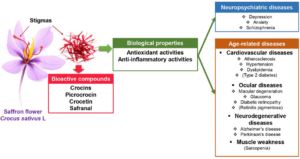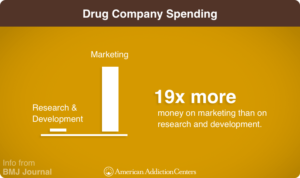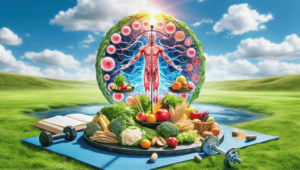Depression is everywhere. Nearly 300 million people around the world are affected, and men, more often than not, are suffering in silence. While antidepressants like Prozac (Fluoxetine) remain the go-to treatment, they come with a list of side effects that can feel like trading one problem for a few others. For a lot of guys, those side effects include emotional flatness, sexual dysfunction, or just feeling like a dulled version of themselves.
Enter saffron.
Yeah, the spice in your grandma’s rice dish, or your friend’s grandma’s, or that restaurant you went to that one time.
Recent clinical research shows that saffron – that deep-red thread pulled from the flower of Crocus sativus – may be just as effective as Prozac at treating depression. And if that’s true, it opens up a huge conversation. Not just about your brain, or your mood, but about what happens when natural remedies begin to rival Big Pharma’s biggest products.
This is what happens when something natural might actually work better.
What Happens to You: A New Option for Men
The Science Is Real
A recent meta-analysis comparing saffron to Fluoxetine (the generic form of Prozac) and placebo found that saffron matched Prozac in improving symptoms of depression. Patients who took saffron experienced significant improvements in their Hamilton Depression Rating Scale (HDRS) scores – a clinical measure used to assess depression severity.
Other studies have shown saffron also holds its own against Imipramine, another commonly prescribed antidepressant. Across multiple trials, saffron consistently performed as well as pharmaceutical options.
Why Saffron Might Be Better for Some
What makes saffron compelling isn’t just the fact that it works. It’s how it works, and also what it doesn’t do. While Prozac inhibits serotonin reuptake, saffron seems to work similarly, but also supports the nervous system through multiple other pathways:
and also what it doesn’t do. While Prozac inhibits serotonin reuptake, saffron seems to work similarly, but also supports the nervous system through multiple other pathways:
- Increases serotonin levels naturally
- Reduces oxidative stress by boosting antioxidants like glutathione and catalase
- Modulates the HPA (hypothalamus-pituitary-adrenal) axis to regulate stress
- Encourages neuroplasticity and brain regeneration in key areas like the hippocampus and prefrontal cortex
That means it may support your mood and your brain health long-term – without the numbness or performance issues often associated with SSRIs.
Why This Is a Big Deal for Guys
Most men don’t want to feel like they’re always on something. They want results and control, not chemical sedation to the point of emotional numbing. If saffron can help ease depression while boosting libido, reducing anxiety, and keeping their mental sharpness intact, that’s a massive win.
And frankly, an increasing number of guys would rather take a natural supplement than walk out of the doctor’s office with a prescription they don’t fully understand.
Saffron’s Ancient Medicinal Roots
Saffron’s therapeutic use is far from new. For over 3,000 years, civilizations across the Middle East, India, and the Mediterranean have turned to this vibrant red spice for more than just flavor. In ancient Persia, saffron was used as a mood enhancer and even as a sedative. Traditional Persian medicine prescribed it for sadness, anxiety, and even grief, centuries before “depression” was a clinical diagnosis.
In Ayurvedic medicine, saffron is considered tridoshic, meaning it balances all three doshas – Vata, Pitta, and Kapha – making it one of the more universally harmonizing herbs in that tradition. It was often used to improve mood, boost libido, and support cognitive function.
Chinese medicine also valued saffron, though it was considered a rare and luxurious substance. It was typically used to invigorate blood circulation and treat emotional stagnation, especially in women.
What’s remarkable is that ancient healers, without lab coats or clinical trials, intuitively understood saffron’s effect on the mind and spirit. Modern science is now just catching up.
What Happens to the System: Follow the Incentives
Why You Haven’t Heard More About Saffron
So if this stuff is so promising, why isn’t saffron being offered as a first-line treatment?
Simple: there’s no money in it.
You can’t patent a plant. And if you can’t patent it, you can’t monopolize it. That means no billion-dollar marketing campaigns, no exclusive sales rights, and no huge financial incentive for pharmaceutical companies to push it.
Not a Conspiracy – Just Capitalism
Guys, this isn’t about conspiracy theories; you can take off your tinfoil hat. This is about the inherent structure of most business models. Drug companies are incentivized to invest in treatments that generate returns higher than the previous year. Running large-scale clinical trials costs millions of dollars. Why would a company spend that money on a natural compound they can’t own?
Saffron isn’t alone. Countless natural solutions – from medicinal mushrooms to adaptogenic herbs – remain understudied and underutilized because they don’t fit neatly into the profit structure of modern medicine.

If Saffron Works, the Implications Are Huge
If people begin turning to saffron (and other natural remedies) en masse, that means fewer prescriptions. Less reliance on the insurance-orchestrated medical industrial complex. A shift away from a purely symptom-management model toward actual healing.
And make no mistake: that’s a cultural and economic threat to the status quo.
What Happens Next: A New Kind of Healing
The Rise of Holistic Alternatives
 We’re seeing a rise in interest in functional medicine, biohacking, ancient healing practices, and plant-based solutions. Saffron is just one thread in a much bigger tapestry of people seeking agency over their health.
We’re seeing a rise in interest in functional medicine, biohacking, ancient healing practices, and plant-based solutions. Saffron is just one thread in a much bigger tapestry of people seeking agency over their health.
From ashwagandha to lion’s mane, there’s a groundswell of energy around healing and optimization that doesn’t rely solely on synthetic pharmaceuticals.
Proceed with Wisdom, Not Hype
None of this means that saffron is some sort of cure-all. And it certainly does not mean you should ditch your meds overnight. Real healing is about integration. If this renewed perspective on saffron speaks to you, talk to a practitioner who understands both the natural and pharmaceutical sides of care.
And make sure you’re getting it from a reputable source. Most studies use 30mg/day of a standardized extract, not grocery store saffron threads.
The Point Isn’t Just Saffron
The point is about the possible implications. The strangely revolutionary, but actually original, idea that healing doesn’t always come in a pill bottle. That better outcomes might come from better questions and relationships with the natural world around us, not just drugs from labs.
This is what happens when people start thinking differently. Feeling differently. Demanding more than side-effect management.

So What Happens
When saffron works better than Prozac for you, or your loved ones, or a stranger you meet on a plane, it changes more than your mood. It changes your relationship to healing. It invites you to ask: What else is out there? What else have we overlooked because it couldn’t be sold back to us?
This isn’t about demonizing medication. It’s about remembering that the human body evolved alongside plants, not pills. And sometimes, nature still knows best.
The real “what happens” is this: You take your power back.
And that changes everything.








